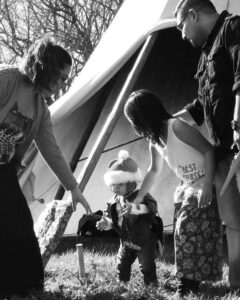Koganaawsawin connecting youth to Anishinabek culture through new land-based programming initiative

By Victoria Racette
NIPISSING FIRST NATION— The Youth Well-Being Team of Koganaawsawin has recently announced a funding opportunity for Anishinabek First Nations to enhance and/or develop their land-based youth programming. The new initiative focuses on increasing youth well-being through healing, cultural learning opportunities, and the development of connection or reconnection to the land.
The funding, received through Indigenous Services Canada, will enable Koganaawsawin to purchase up to $2,000 worth of land-based supplies and equipment for each of the 39 Anishinabek First Nations.
“Communities across the Anishinabek Nation have been requesting assistance with youth land-based programming. Earlier this year, we were delighted to hear that our funding proposal had been accepted,” says Kelsey Anger, Youth Well-Being Coordinator for the Lake Huron Region. “Land-based programming fosters resiliency in youth. Our role, as Youth Well-Being Coordinators, is to bridge the gap between the needs of the youth in our communities and the services or resources available to them.”
Through land-based programming, Anishinabek youth will have access to experiential learning and Anishinaabe teachings, hands-on experiences incorporating Anishinaabemowin, transferable skills-building, and teachings grounded in Indigenous knowledge. They will also have opportunities to learn about the natural elements of the earth, knowledge about how to live off the land and how to care for and protect Shaakmikwe (Mother Earth), critical survival skills, food foraging, harvesting and natural resources, and ways to connect to the land – physically, mentally, emotionally, and spiritually.
“From a cultural perspective, land-based activities can provide our youth with a sense of connection to the land, themselves, and to all of creation,” commented Pam Plain, Youth Well-Being Coordinator for the Southwest/Southeast Regions. “As Anishinabek people, we are and have always been stewards of the land.”
Land-based activities vary from community to community and can include activities such as hiking, wood carving, orienteering, fishing, water activities, crafting, hunting, harvesting, rites of passage teachings, and winter survival skills.
“The impacts of colonization have caused a loss of connection to the land for many Indigenous youth,” said Asheley Wilson, Youth Well-Being Coordinator for the Northern Superior Region. “The hope is that this new initiative will strengthen community capacity for land-based programming and connect more Anishinabek youth to their culture.”


